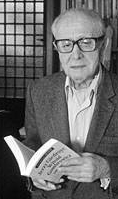Jerzy Giedroyc, who died recently in Paris, witnessed the whole of Poland's 20th-century history.
After 1939, when the Polish government had evacuated itself to Romania in the face of the advancing Germans and Russians, he lived the life of an emigrant. By then, he was already an employee of the Ministry of Industry and Trade and the editor of his third magazine, Polityka. In it, he wrote: "Our program is to conduct Poland's great mission in the East. Our goal—a strong Catholic state with authoritarian, yet parliament-controlled, government; a state co-existing with minorities."
This statement may have sounded a little doubtful to Belarusians, Ukrainians and Lithuanians back then, but Jerzy Giedroyc was to become a true advocate of sensible Polish policy towards both minorities and their homelands, an issue that has been one of Poland's most difficult and awkward problems since it gained independence in 1918. Even now, Polish political elites still seem to treat their eastern neighbors as inferior, and Polish policy leaves much to be desired.
Cultural bite
The tool, which Jerzy Giedroyc created and skillfully used to push for the realization of his eastern-oriented goals, was the renowned Kultura monthly, issued with an astonishing regularity in Paris since the fall of 1947 (only the first issue appeared in Rome and bore information that it was to be a quarterly).
Initially, a literary magazine with works from such names as Czesław Miłosz, Witold Gombrowicz or Gustaw Herling-Grudziński (who also died this year), Kultura quickly evolved into an influential, thought-provoking (and, of course, banned in the then-communist Poland—the first trial based on charges of distributing it took place in 1958) political-cultural periodical. It made many very uneasy, be they subsequent Communist governments, or post-1989 democratic elites.
The former banned it, because for 40 years Kultura, ingeniously edited by Giedroyc, was one of the few credible sources in Polish that took on the always-difficult themes of relationships between Poles and Russians or Ukrainians and also analyzed the situation in Poland itself. But Giedroyc also landed in the bad books of Polish post-war emigrants, when he dared to say that Lviv should remain Ukrainian and Vilnius Lithuanian (at the time, the loss of those two cities was still a fresh wound for Poles).
He was thought of as a dreamer, a political maniac, when he talked about the collapse of the Soviet Union, and that Poland would have Ukraine, Belarus and Lithuania as independent partners. The post-1989 elites felt uneasy when faced with Giedroyc because, after the collapse of the Soviet Union, he not only refused to express contempt towards Poland's eastern neighbors, but engaged even further in propagating his idea of building friendship with them:
"Our main goal should be normalizing relationships with Russia and Germany, exerted together with defense of the independence of Ukraine, Belarus and the

|
His words found sympathy from Sokrat Janowicz, a Belarusian writer: "He was one of those great Poles who defended us against nationalistic and chauvinistic atrocities. Giedroyc understood us and indicated that demoralization prevails in the Polish attitude towards minorities."
In an interview for a local weekly in 1998, Giedroyc said: "I have no doubts that we should join NATO and the European Union—but in order to propagate enlargement of those institutions further to the East."
Jerzy Giedroyc and Kultura were one. Talking about his life must greatly overlap with its primary achievement—over 600 issues of an often biting and bitter, but always courageous and truthful, enterprise, which much reflected his personality, confirmed in both his autobiography and reminiscences of his friends.
No wonder then that Kultura will cease to appear after its editor's death, except for one last issue. In accordance with Giedroyc's will—disclosed last week—the magazine will not continue without him.
His death is an irreparable loss.
Wojtek Kość, 22 September 2000
Moving on:
- Archive of CER articles on Poland
- Browse through the CER eBookstore for electronic books
- Buy English-language books on Central Europe through CER
- Return to CER front page




